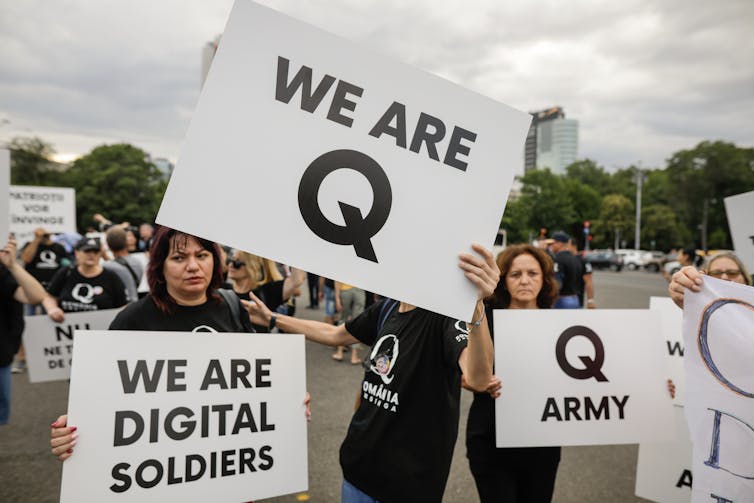Source: ForeignAffairs4
Source: The Conversation – UK – By Robin Canniford, Professor of Markets, Business, and Society, University of Bath
Psychologists have long considered how a tendency towards irrational thinking or particular personality traits might predict peoples’ interest in conspiracies. Yet these individual factors do not explain the group processes through which conspiracy theorists are extending their influence and impact.
Over five years, we sought out and got to know people on the cusp of becoming conspiracy theorists. And the results of our new study show that a sense of community activism is attracting people to these ideas.
Indeed, contrary to the stereotype of isolated keyboard warriors who have gone down the rabbit hole, conspiracy theorists are becoming organised, recruiting supporters, picketing vaccination centres and vandalising telecommunication and traffic infrastructures.
Our research examined the growing interest in conspiracy theories and how associated activism emerges. Immersive research with conspiracy theorists is rare. But revealing our status as researchers actually allowed us to build relationships with people, who shared insights into what motivates their involvement.
In particular, we spoke to people about conspiracy theories concerning 5G technology, COVID-19, 15-minute cities and low-traffic neighbourhoods. We also took part in online discussions and travelled the UK to sit in on public meetings and conferences. Ultimately, our insights revealed how people tend to follow a pathway from initial interest, to community engagement and potentially activism.
Awakenings
Belief in conspiracy theories is often initiated by traumatic life events. Job losses or the death of a loved one can trigger anger and suspicion towards public services, authority figures, and experts. This is especially so if people feel that the tragic or destructive events that affected them could have been averted. And these emotions can motivate a search for answers.
When conspiracy theories claim to explain painful personal circumstances or wider fears over COVID-19, or climate change, people can experience “awakenings”. These are moments of insight during which people come to believe that the causes of their problems lie with secretive groups which control society.
One person we spoke to described conspiracy theories as enabling him to “access the way the world really works… as if a light was switched on in my head and I could see things clearly”.
People rarely experience their awakening in isolation. In online group chats, people discover others with similar problems. In public meetings, beliefs in various theories are boosted by interactions where people discuss their suspicions over who is to blame for particular issues. In the process, these groups feed off their common emotions, building an atmosphere of energy and excitement.
The loss of traditional meeting places such as pubs and high streets, along with high levels of loneliness, may be driving people to look for new forms of connection and meaning.

Mircea Moira/Shutterstock
The people we spoke to expressed surprise at the social connections they had found through these communities. As one participant put it, “there’s a lot of support out there for people who are doing their own research… there is always someone wanting to hear more, building on the work of others, giving each other support. There’s a real buzz in this community.”
Do your own research
Conspiracy theories don’t merely offer alternative explanations for events, they are resources for communities that provide identity, purpose and belonging. These benefits may explain why it is so difficult to talk people out of their beliefs in conspiracy theories.
Indeed, when conspiracy communities generate common interpretations and shared emotions, conspiracy theories can resonate powerfully, making them seem more real than they are.
This effect is compounded by the way which conspiracy theories invite believers to build on ideas by “doing their own research”. The internet serves as a vast database where conspiracy theorists can discover articles, documents and scientific reports to support their claims.
And despite the questionable quality of many such sources, contributing to conspiracy theories can provide a boost to people’s self esteem, making them feel like experts and heroic detectives. A key aspect of these communities is how they empower members to contribute.
Yet, beyond generating more theories, conspiracy communities are becoming organised networks for protest and activism. Given that conspiracy theories raise suspicion and anger over peoples’ problems, and point the blame at particular targets, we found that believers can feel compelled to take part in protests.
For example, some claim that the urban planning concept of 15-minute cities is part of secretive government scheme to limit citizens’ movement. Protesters against these and other efforts to improve urban environments are uniting under slogans such as “stop the tyranny”.
Who benefits?
Activism based on conspiracy theories can come with serious risks. Many of those involved lose contact with family and friends. Increasingly, conspiracy activists are being charged with crimes. In 2024, an anti-vaccine conspiracy theorist was sentenced to prison for five years for encouraging violence against chief medical officer for England, Chris Witty.
Moreover, when conspiracy theorists take action without tested evidence, they may misidentify targets. This can result in harm to innocent people and can undermine the very institutions needed to solve crimes.
To be sure, instances of conspiracy and foul play by powerful figures and organisations do happen. You have to wonder how much energy then, is wasted fighting imaginary enemies while actual wrongdoing is overlooked.
Perhaps the real winners here are the conspiracy entrepreneurs – people who capitalise on conspiracy theories by creating content that heightens peoples’ suspicions about problematic events. In the process, these people build attention and fame, while peddling products and services from books, merchandise and coaching, to vitamin pills and gadgets.
![]()
The authors do not work for, consult, own shares in or receive funding from any company or organisation that would benefit from this article, and have disclosed no relevant affiliations beyond their academic appointment.
– ref. Why people embrace conspiracy theories: it’s about community, not gullibility – https://theconversation.com/why-people-embrace-conspiracy-theories-its-about-community-not-gullibility-262276

